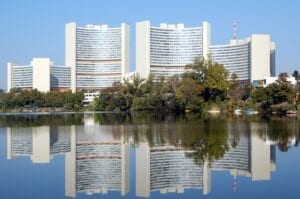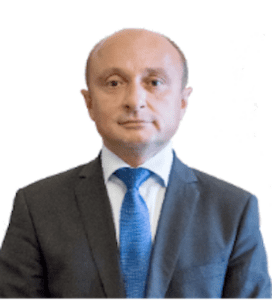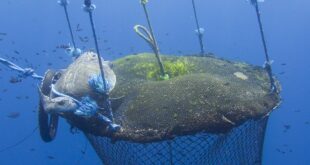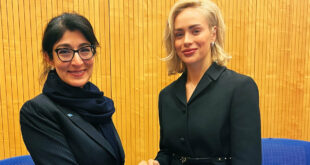by Antonino Salmeri

In June 2021 the UN COPUOS Legal Subcommittee announced the creation of a working group on Space Resources. SpaceWatch.Global contributor Antonino Salmeri had the chance to talk with Ambassador Andrzej Misztal and Professor Steven Freeland, Chair and Vice-Chair of the working group, about this significant development.
Ambassador Misztal and Professor Freeland, thank you so much for agreeing to this interview. To start with, let’s give some context to all our readers who may not be too familiar with the substance and processes of international space law. Why is there an international debate on the regulation of space resource activities, and what are its key issues?
The idea that the natural resources of space could in some way be used for the benefit of humanity is not a new one. We have in place, for example, a global governance regime for the use of radio-frequency spectra by satellites located on the Geostationary Orbit (GEO), an extremely valuable orbit approximately 35,000 km above the Earth. That regime is effectively managed through the Geneva-based International Telecommunication Union (ITU), of which virtually every country is a member, and whose Constitution describes GEO as a ‘limited natural resource’ in space.
Given the legal characterization of space as an area that is beyond national jurisdiction and is not subject to national appropriation, it is important that space, and the use of its resources, are managed in a way that, as much as possible, preserves the safety, stability and sustainability of space for present and future generations. This is done primarily through international law and specifically agreed on multilateral governance structures.
In terms of the ‘hard’ resources of Celestial Bodies, there has been much debate at various times as to what structures and principles might be appropriate in relation to their possible ‘exploration, exploitation and utilization’ in the future. This is, to many, a fundamental issue in terms of defining our relationship with space.
The issue was already of great interest in the 1970s, largely due to interest in the possibility of exploiting the natural resources of the Moon, based on the achievements of the Apollo missions and an analysis of the Moon rock samples that were brought back to Earth. Ultimately, this resulted in the agreement by consensus of the UNCOPUOS Member States as to the terms of the 1979 Moon Agreement (MA). The multilateral discussions in UNCOPUOS coincided with other negotiations relating to possible exploitation of the ‘Area’ – the deep sea-bed – that was reflected in the 1982 Convention of the Law of the Sea (UNCLOS).
A comparison of the salient provisions of the MA and UNCLOS show some similarities in approach (but also some fundamental differences). Essentially, the issue brought to the fore significant differences of perspective between, in general terms, the more developed industrialised countries that might have had the capabilities to undertake such activities, and other countries that viewed space as an area whose benefits were to be shared in an appropriate way amongst the global community, irrespective of who undertook the activity.
The resultant provisions in both instruments were a compromise between the two extremes but met with resistance from the former. With respect to UNCLOS, their concerns were assuaged by a subsequent agreement (the 1994 New York Agreement), and that treaty now has >190 States parties. No such subsequent arrangements were implemented for the MA, and as is well known, that instrument has 18 States parties.
The issue of space resources exploitation has again become of great interest over more recent years, particularly due to the technological developments of the private sector/industry and the work of civil society and legal/policy experts. We now also have national initiatives in the form of legislation, bilateral arrangements between countries wishing to engage in such activities, and ‘minilateral’ accords between a relatively small but growing number of countries. All of this work raises a multitude of issues and inputs that, in the end, might inform the broad multilateral discussions on what might be appropriate in terms of moving forward.
In just 5 years the LSC of COPUOS went from the adoption of a new agenda item on space resources to the establishment of a dedicated working group – quite an impressive timeline for a diplomatic body. Can you tell us how it all happened and what have been the main obstacles that had to be overcome?
As mentioned, in recent years there has been renewed and, in several quarters, quite enthusiastic interest regarding the possibility of possible exploitation of resources on Celestial Bodies in the future. Various private entities have been established (some of which have fallen away but have been replaced by others) to promote the technology for such activities.
This development has led to several countries introducing national legislation to promote such activities – the first being in 2015 in the United States. Similar national initiatives have followed in other countries. The introduction of such legislation gave rise to considerable comment within the Legal Subcommittee (LSC) of UNCOPUOS, and as a result, it was decided to introduce a single agenda item on the ‘exploration, exploitation and utilisation of space resources’ in 2017, thus allowing a more formal and dedicated process by which Member States could express their particular views on the issues.
It became increasingly clear that this was a topic that was of significant interest for many Member States and, in 2019, a proposal was tabled already then to establish a Working Group on the issue. Whilst, at that time, the proposal was not agreed through the consensus decision making mechanisms of the LSC, it was agreed to instead establish ‘scheduled informal consultations’ (SIC), to take place in addition to the discussions under the single agenda item (which has been retained each year). We were honoured to be appointed as the co-Moderators of those consultations and, during LSC in May/June 2021, we held eight sessions of SIC, at the conclusion of which the Member States agreed to establish a formal 5-year Working Group (with Andrzej as Chair and Steven as Vice-Chair).
More recently, at the just concluded plenary session of UNCOPUOS, the Working Group held four meetings, and Member States agreed the specifics of the Mandate, Terms of Reference and Work Plan/Methods of Work for the Working Group. Those details can currently be viewed in Document A/AC.105/L.322/Add.6.
Given the increasingly strong interest by Members States in the issue, and its sensitivities and different perspectives, achieving consensus and thus enabling the Working Group to move towards starting the substantive work in earnest, was an excellent outcome and, seen in a broader context of today’s complex geopolitical climate, a quite significant ‘success’. It demonstrates the importance of the multilateral process through UNCOPUOS and is indicative of the good faith and widespread flexibility and willingness of Member States to find a common path forward in relation to the ‘big’ issues regarding the peaceful exploration and use of outer space.
Over the last years, regulatory initiatives dedicated to space resources – from both States as well as non-governmental bodies – have multiplied. This proliferation speaks to the richness of the debate, but also to its fragmented status. What role can the SRWG play in this context, and what are its main goals?
We have referred to some of these initiatives – both regulatory and non-regulatory – above. We are not sure that we agree with your description of a ‘fragmented’ context. Rather, as should be expected, as with any complex issue, many factors should be considered so as to ensure that all relevant information is appropriately taken into account. Any consideration of possible future space resources activities will necessarily involve not only legal and governance considerations, but also very significant technical, economic, political, cultural, scientific and other factors.
It is only natural, therefore, that many potential stakeholders, and the broader elements of civil society, will be looking at the issue from their own perspectives. This adds, as you say, to the richness of the discussions, but it is more than that – only by understanding the complete range of relevant issues will any ultimate outcomes from multilateral discussions reflect the most appropriate way to proceed.
In this regard, the Member States have determined a clear methodology for the Working Group to collect relevant information and, in conformity with the established practice of UNCOPUOS, also to take into account inputs from a broad range of stakeholders and permanent observers of the UNCOPUOS. This will facilitate an inclusive and informed discussion among Member States at the meetings of the Working Group.
The mandate of the SRWG foresees a step-by-step approach hopefully leading to the development of “initial principles” for the safe, sustainable, rational and peaceful conduct of SRA. Can you tell us more about what these principles may look like?
This will be a matter for Member States to determine during the discussions of the Working Group. Undoubtedly there will be a range of views that will be expressed by Member States that will be discussed and debated. At this stage, it is inappropriate to pre-judge what any outcome might look like.
SRA will be performed in conjunction with related operations such as landing and processing, and their practical features will vary depending on the celestial body in which they are conducted. Can you tell us to what extent these technical and practical considerations will play a role in shaping the results produced by the WG?
The development of relevant technology, and possibly the undertaking of relevant space activities, will most likely continue during the term of the Working Group. This has been acknowledged by Member States who, in the agreed mandate of the Working Group, have tasked it to collect relevant information ‘with respect to scientific and technological developments and current practices, taking into account their innovative and evolving nature’.
A topical subject is the relationship with non-governmental stakeholders like companies or academia. Under the terms of reference of the WG, the Chair and Vice Chair will play a decisive role in “filtering” those inputs provided by permanent observers and all other stakeholders. Can you tell us more about how this function will be performed?
The process by which non-governmental inputs might be taken into account by the Working Group was the subject of thoughtful discussion during the SIC and the meetings of the Working Group. In the end, agreement was reached that this would involve the provision of such inputs to the Working Group, and the Chair/Vice Chair (with the assistance of the Secretariat) working with the Working Group to ensure that relevant inputs be taken into account. We believe that this process will work effectively and smoothly and ensure that the practice of the UNCOPUOS is not departed from.
Other WGs within COPUOS, like LTS Guidelines’ one, have successfully relied on dedicated “expert groups” to support them in their activities. Is this something that you are also considering for the SRWG?
This may be an issue that Member States might wish to consider.
It is usually said that space diplomacy is too slow compared to the pace of business and technological development. With the first commercial SR missions scheduled for 2024 and a workplan envisaging the first results no earlier than 2026/2027, how do you plan to ensure the practical relevance of the WG’s conclusions?
The issue of the exploration exploitation and utilization of space resources is, as mentioned above, a very significant issue for humanity. It is crucial that whatever outcomes the global community determines – through the multilateral process at UNCOPUOS – are appropriate not just for the short term, but for many years. In our opinion, short-term solutions regarding such a complex issue would not appropriately serve the global community. The Member States have instigated the Working Group on space resources as an important step so as to ensure that a logical, comprehensive, inclusive and open multilateral process is undertaken to determine what is required.
In this regard, therefore, we believe that the work of the Working Group will be highly practical and relevant and will reflect a forward-thinking consensus view on what the correct path will be relating to this important issue.
SpaceWatch.Global thanks Ambassador Misztal and Professor Freeland for the interview.

Steven Freeland is Emeritus Professor, Western Sydney University; Professorial Fellow, Bond University; Co-Principal, specialised space law firm Azimuth Advisory; Director, International Institute of Space Law; Member, Space Law Committee of the International Law Association; Member, Space Law and War Crimes Committees of the International Bar Association; and Member, Australian Space Agency Advisory Board. He was recently appointed by the United Nations Committee on the Peaceful Uses of Outer Space (UNCOPUOS) as Vice-Chair of a 5-year Working Group addressing issues related to space resources.
Andrzej Misztal is the Head of Division of Public International Law in the Legal and Treaty Department in the Polish Ministry of Foreign Affairs. He was previously the Director of Legal and Treaty Department, Legal Adviser of Poland to the United Nations and representative of Poland in the 6th Committee of the United Nations General Assembly. He also served as the Deputy Permanent Representative of Poland to the United Nations Office in Geneva. He specializes in international public law, including international humanitarian law, disarmament and outer space law. He is the former Chair of the Legal Subcommittee of COPUOS.
Steven Freeland is also the host of the Space Café “Law breakfast with Steven Freeland”. The next live event will be on 23rd September 2021 at 9:30 am CEST / 5:30 pm AEDT.
 SpaceWatch.Global An independent perspective on space
SpaceWatch.Global An independent perspective on space





